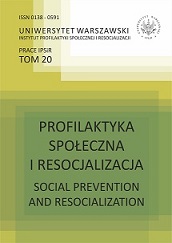Mowa i polityczność - przyczynek do antagonistycznej teorii języka
Language and Politicalness—A Contribution to the Antagonistic Theory of Language
Author(s): Sebastian MichalikSubject(s): Social Sciences
Published by: Instytut Profilaktyki Społecznej i Resocjalizacji UW
Keywords: "Foucault; Bourdieu; Habermas; theory of language; politicalness
Summary/Abstract: The main subject of this article is the question of political meaning and functions of language. The main problem which shall be addressed is the question whether a certain use of language can neutralize conflicts and thus lead to an understanding by bringing people together into a consistent political community, or does it rather reflect the underlying relations of social forces along with their inherent contradictions and inequalities. The first part of the article contains an overview of the standpoints of H. Arendt and J. Habermas. The core concept of their theories is that language can help reach a general agreement on the basic aspects of public affairs and hence help form a coherent political universe. According to this conception a specific social order emerges out of a network of spontaneous linguistic interactions. This social order is built on an agreement concerning interests and norms worked out in the process of communication. This vision corresponds with the modern concept of public opinion, which implies the notion of language as a medium of rational argument that allows the development of shared conceptions. The theoretical perspective which I characterized above I label a political paradigm of affirmation. In the subsequent part of the article, this paradigm becomes a subject of critical polemics. In opposition to them I attempt to outline an antagonistic theory of language. Its main assumptions and settlements refer to a language analysis and discourse of the twentieth century French thinkers: M. Foucault and P. Bourdieu, and benefited from the historical output of T. Hobbes. The antagonistic theory of language delineates the focal point of the analyses carried out in this paper. According to antagonistic framework, language is involved in a social network of relationships, domination and conflict and hence it is an instrument of influence and impact, rather than means of communicating and understanding. As such, it serves as an instrument of power and struggle, and not of building consensus. This is why linguistic relations between people can be perceived as mere symptoms of systems of power that shape the social world. Such an approach implies a vision of democracy according to which it is not so much a field of political compromise and consent, but a universe torn apart by antagonisms. Language plays a fundamental role in this universe—not only is it a tool, but it itself is at stake in the democratic struggle for power.
Journal: Prace Instytutu Profilaktyki Społecznej i Resocjalizacji
- Issue Year: 2012
- Issue No: 20
- Page Range: 79-104
- Page Count: 26
- Language: Polish

